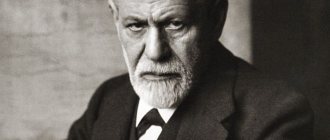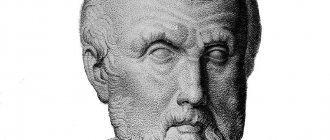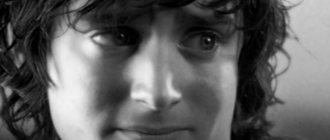- Take the Shmishek questionnaire online
- Addition to the transcript, or How many accentuations do you have?
We suggest you take the character accentuation test , or the Shmishek questionnaire , and find out which types of accentuation are most pronounced in you.
As the name of the test suggests, the questionnaire was developed by Šmishek based on the dominant character traits identified by Leonhard for a particular type. This accentuation test consists of 97 questions.
regarding 10 types of accentuations (the questionnaire does not cover extroverted and introverted types).
88 questions relate directly to accentuations, and another 9 determine the honesty (reliability) of the answers you give. This indicator is indicated in the “False” column. If it's high enough, it means you probably haven't been completely honest with yourself.
The essence of the technique
The method consists of presenting a person with 88 questions to which he must answer briefly “yes” or “no” without thinking for a long time. It is important to give answers based on your current mood. As a result of the survey, after further processing of the data, the accentuation of the human personality is determined, which is selected from the following ten types classified by Leonhard Shmishek:
- The demonstrative appearance is characterized by the desire to constantly oust other individuals from the environment.
- Pedants, inert behavior with sufficient rigidity, unable, as a result of inhibited mental activity, to remove traumatic experiences from thinking.
- The stuck personality type is characterized by persistent preservation of the resulting effect in the psyche.
- Excitable individuals do not control emerging impulses and drives; they are characterized by high impulsiveness of behavior.
- Hyperthymic people are characterized by high spirits, which is accompanied by vigorous activity and constant optimism.
- Distic nature is characterized by the manifestation of a low mood, pessimistic thinking, highlighting unsightly life situations and the shadow sides of existence, and slow-wittedness.
- Anxious-fearful individuals are afraid of habitual actions, show timidity, and are unable to take action due to constant timidity.
- The cyclothymic type is characterized by a constant change from vigorous activity and optimism to pessimistic reasoning and inactivity.
- Affectively exalted individuals in all manifestations of life experience extreme delight or unrequited sadness; people of this type are constantly in these extremes.
- The emotive character in terms of mental manifestations is close to the previous type, but the peculiarity is that the mood is not so violent and is located in an average emotional background.
Two types of techniques
The maximum result value for each type of accentuation was selected as 24 points . A sign of a certain personality type is considered to be a score exceeding 12 points. Variants of the technique have been developed for adults and children:
The method for determining accentuation reveals:
- character type and personality;
- motivation of actions;
- temperament;
- relationships with other individuals;
- intellectual development;
The difference between the children's and adult questionnaires is that the first determines the individual's professional relationships, and the second examines the child's behavior in educational and play activities. Different wording of questions helps to identify the prevailing personality accentuations for both a child and an adult; the results are processed in the same way for the two options.
The essence of the test
Test cat. Questions and answers. short orientation test online
The person is asked questions related to his character. The answer must be given as quickly as possible without much thought. There are 2 options to choose from: “yes” or “no”, there is no third option. On the form, on the contrary, you must mark your answer with a cross in the appropriate “yes” or “no” box, opposite the number corresponding to the question number. After all the questions have been answered, the results must be calculated.
To do this, first count the answers indicating a plus and, accordingly, then the negative answers. At the final stage, the final points (+ and -) on the scale are added up. Then the result obtained is multiplied by a certain coefficient, which is different for each type of character accentuation. Analysis of the final test results will show that there are 10 indicators with a strict focus on the severity of a certain personality accentuation.
Conducting a survey
The survey is based on the theory of accentuated personalities , developed by Leonhard Schmishek. In accordance with it, all characteristic personality traits are divided into basic and additional. Basic personal qualities determine the core of character, development, adaptation in society, the integrity of the mental state, that is, they characterize a person’s character. If unfavorable external conditions arise, then the main features can become a destructive force for the individual personality and acquire a pathological direction.
Leonhard Šmishek considers a person with pronounced basic traits as an accentuated personality and the manifestation of emotional traits to be pathological if they do not go beyond standard manifestations. The psychologist believes that a character with pronounced accentuation has the potential for both positive and negative actions.
Instructions for determining personality accentuation
The person being tested is offered 88 statements, which are called questions. If the subject agrees with the statement, he answers “yes”, otherwise he gives a negative answer. You need to react intuitively and without much thought.
Processing of the received information is carried out by an initial count of responses that match the standard key, and a separate check for matching sincerity is carried out. The maximum sincerity indicator is determined on a scale and is 10 points. If the total score is not higher than 5, then the majority of answers are considered sincere. A range of values from 6 to 7 indicates that some of the answers are implausible. Increasing the indicators to 8–10 points negates the veracity of the answers, and the survey is considered unreliable.
The points on each scale are added up, and the sum is multiplied by the coefficient recommended in the key, with the maximum number of points scored not exceeding 24. The result after multiplication is determined in accordance with four developed levels of accentuation of a certain personality trait:
- low manifestation are considered values in the range from 0 to 6 points;
- average values of trait severity are between 7 and 12 points;
- increased manifestation of a characteristic trait - from 13 to 18 points;
- the expression of emotional traits gains an accentuation value in the range from 19 to 24 points.
Human character profile chart
The results obtained during the processing process serve as data for drawing up an analytical graph .
They begin to study the graph by considering the general shape, taking into account how the indicators are located relative to the upper (18 points) and lower limit (7 points). Among the numerous cases of placement, several standard forms are distinguished; sometimes all or the vast majority of points corresponding to the indicators are in the area of low values (from 0 to 6 points). In this case, data interpretation is carried out in two directions:
- The first direction, if a person is characterized from the point of view of demonstrating social norms of behavior, at his discretion, such individuals show reduced self-criticism, insincerity, and sometimes demonstrate pretentious traits. Such data is usually designated as unreliable, although some information can be gleaned from it.
- Other indicators are given by people with traits of passivity, inconspicuousness, and who do not crave high achievements. A person does not control his destiny, he does not have the opportunity to become a leader. Often individuals with this character are interested in mystical help or become hostage to religious beliefs. The personality cannot withstand troubles and difficulties and is not inclined to change.
If the indicators on the graph are within 19 points , then the accentuation of character traits is obvious and it is worth talking about a bright personality with a complex and multifaceted emotional manifestation. Raising the bar to 22 points indicates obvious accentuation, but such indicators indicate the emergence of communication problems.
Very often in practice there is a graph where the line has a jagged shape, alternating low and high values. Studying this nature of the curve requires special care, since the values can indicate the liveliness of nature with the manifestation of shortcomings and advantages, as well as determine a problematic personality in upbringing and behavior in society.
one high indicator stands out in the overall uniform flow of the curve , this indicates a clear manifestation of accentuation or the need to behave in accordance with the main features of this type of personality.
On the generally flat position of the curve, several sharp jumps in values stand out, sometimes reaching the zone of the highest indicators - which means that when characterizing this nature, one should talk about a combination of accentuations of various types.
Hysterical type
Character accentuation test (Shmishek questionnaire)
Hysteroids are characterized by a high need for attention to themselves and egocentrism. Demonstrative, artistic
They do not like it when someone else pays attention to them or praises others. There is a high need for admiration from others. Teenagers of the hysterical type strive to occupy an exceptional position among their peers, attract attention to themselves, and influence others
They often become the initiators of various events. At the same time, hysterics are unable to organize those around them, cannot become an informal leader, or earn authority among their peers
Teenagers of the hysterical type strive to occupy an exceptional position among their peers, attract attention to themselves, and influence others. Often become initiators of various events
At the same time, hysterics are unable to organize those around them, cannot become an informal leader, or earn authority among their peers.
Description of personality types in accordance with the development of Leonhard Schmishek
Demonstrative type of behavior
The sociability and courtesy of these individuals is obvious. Artistic and extraordinary personalities prefer everything non-standard and bright. They inspire trust and affection among others, are able to inspire ideas in themselves and others and influence their interlocutors.
Strives for leadership positions in the team, easily makes connections and contacts . In the most unsightly situations, he knows how to consider the advantages and use them for his own benefit. Despite the gentleness in communication, there is a tendency to initiate intrigue.
This type of personality is characterized by jealousy and envy, and often treats the success of others as their own failure. The personality can provoke conflict situations; some interlocutors are irritated by increased claims or self-confident statements. He strives to get the attention of others, and on this path all methods are good for him. People of this type are decisive, courageous, charming, bright individuals with well-developed intuition.
Pedantic personalities
Adherents of order in everything, follow the plan in their actions, and if they fail, they experience some irritation . Changes in life cause protest, as pedants have difficulty switching to new circumstances. They pay attention to external trifles and demand this from others; this trait is determined by the desire to control the situation, an attempt to subjugate objective circumstances.
In the business sphere, pedants are thorough, finish the work they start, and are scrupulous. In terms of health, such individuals behave reasonably and do not destroy it by drinking alcohol or other bad habits. Accuracy and strict adherence to standards are often combined with difficulty in making new decisions. Individuals have difficulty adapting to a team; they are indecisive, avoid bright actions, have inert thinking, and savor traumatic events for a long time.
Stuck Type of Human Nature
It harbors within itself for a long time and constantly experiences anger, resentment, fear , sometimes such feelings arise again after a long period of obvious attenuation. The most characteristic manifestations of feelings are envy, injustice, and jealousy. The type that gets stuck for a long time experiences the success of its activities vividly and for a long time.
A persistent and persistent nature, it is very difficult to change the type of activity, but in his field he often achieves outstanding results, strives to surpass other employees, and demands gratitude and real respect.
Stressful situations for the stuck type are uncertainty, violation of developed plans, dissatisfaction with oneself and lack of self-confidence, situations when there is a real leader who can take over his power.
Excitable type
This individual has increased reactivity of the nervous system , developed impulsiveness, hence rash actions and high excitability. The actions of others cause this type of personality a strong impression, such that thinking cannot quickly find the optimal way to react, and he responds with reactive actions.
The perception of someone else's opinion is difficult for excitable individuals, therefore, in order to achieve an adequate response, one has to resort to a long explanation. Often irritable and dissatisfied people respond sharply to criticism and show physical aggression, which they later regret.
Adaptation in society is difficult due to low contact , weakened self-control, disregard for ethical standards, despoticism and conflict. Their stress causes opposition, material and moral damage, the need to choose from many options, punishment for actions, and self-doubt.
Hyperthymic personality type
The mood of these people is constantly elevated, they are full of optimism, active, and cheerful . Kind, carefree and sympathetic, they have a lively mind and talkative nature. Often hypertims are interested in many things at the same time, but since they have unstable attention, they approach all interests superficially and often switch attention.
They have a negative attitude towards critical remarks, love freedom, and easily get used to difficulties. Failures that are difficult to overcome do not knock them out of their usual flow; duties and rules are considered optional. The mood and emotions of a person with this type of character are open and understandable to others. Irritability can be caused if his communication is limited.
Loneliness is an aggravating circumstance, so the type is indiscriminate in making acquaintances, easily finds new contacts and quickly adapts to society. Stress is caused by monotony of the surrounding space, monotonous work, excessive care and control, and lack of competitive spirit.
Dysthymic type of behavior
Due to decreased tone and inhibition of thinking, individuals rarely participate in sociable conversations. Shyness and indecisiveness reveal sublime feelings in nature in the complete absence of egoistic manifestations, and form ethical behavior. Individuals are characterized by a serious attitude to life, conscientiousness, responsibility, and a sense of justice.
Dysthymic natures are distinguished by independent judgments and have their own opinion on each issue. What prevents them from settling into their surroundings is pessimism, isolation, rudeness with friends and family, inertia, and the inability to participate in general joy. Stress is caused by the need to make new acquaintances, excessive moral and physical stress, noisy companies, responsibility for strangers, and rapid changes in situations.
Affective-lobal individuals
Realists by nature , such people do not consider themselves better than those around them, they calmly tolerate their shortcomings, with some temper, they quickly calm down and do not hold a grudge. If a period of sociability begins, then individuals easily make acquaintances and communicate, but as soon as the time of decline comes, a pessimistic mood makes you gloomily experience the smallest failures, avoid contacts and prefer loneliness.
Adaptation in society is hampered by excessive prudence, unstable self-esteem, resentment, pickiness towards others, a wide circle of friends, and the subjectivity of one’s own judgment . Stress causes the collapse of previously planned actions, the need for increased stress, separation from dear people, a change of environment, emotional reproach from people significant to him.
Affectively exalted nature
Characterized by speed of thinking and intensity of response to any events. The mood of a person changes at lightning speed from depression to happy euphoria, victories cause delight, failures unsettle . The motivation for actions is an altruistic mood; selfishness is extremely rare. Empathy for the troubles of friends, compassion for unfortunate animals drive exalted natures to despair.
Stress arises due to a tendency to self-examination, the need for responsibility, weakening of personal self-control, lack of necessary time, lack of communication, accusations of dishonesty, the presence of serious obstacles to the goal, public indications of shortcomings, monotonous work without change.
Emotive type
Nature is prone to long-term experiences from life impressions, mutual negative and positive experiences. A humane and sympathetic person, he subtly perceives surrounding events, and experiences the joy of full communication. Insight and developed intuitiveness allows you to unmistakably feel the change in the attitude of friends and loved ones; all feelings are reflected in facial expressions.
Difficulties with adaptation arise due to a tendency to long experiences, outbursts of anger or jealousy, increased suspiciousness, indecision in unfavorable situations, confusion, partiality and subjectivity of thinking. Stress causes violation of ethics by people around them, their indifference, callousness and rudeness, loss of friends or loved ones.
Neurotic anxious-fearful personality type
Behavior and thinking are characterized by constant anxiety, tension, and anticipation of troubles and sorrows. A person doubts the correctness of his own actions, thoughts and actions; when conflicts arise, he tries to avoid them or smooth them out by any actions. Suspiciousness for no reason is caused by internal experiences; since childhood, such people are afraid of the dark, cemeteries, dogs , thunderstorms, and communicating with new people.
The inability to stand up for their thoughts when the enemy is persistent sometimes leads such people into a state of timidity, humility, even humiliation, so there is a need to be harsh in order to defend their “I”.
Adaptation in a team is hampered by low self-esteem , the inability to defend one’s opinion and fight back, a feeling of constant helplessness, uncertainty, powerlessness, and vulnerability. Stress is dangerous in situations when an individual finds himself in an unfamiliar circle of people, there is a need for a public speech, an exam, a tournament, or a competition. The deterioration of morale is influenced by other people's ridicule, implausible accusations, loneliness and loss of loved ones, and talk of their imminent death.
Questionnaire version for children
- Are you usually calm and cheerful?
- Are you easily offended or upset?
- Do you cry easily?
- How many times do you check for errors in your work?
- Are you as strong as your classmates?
- Do you easily move from joy to sadness and vice versa?
- Do you like to be in charge of the game?
- Are there days when you get angry at everyone for no reason?
- Are you a serious person?
- Do you always try to conscientiously complete your teachers’ assignments?
- Can you invent new games?
- Do you quickly forget if you have offended someone?
- Do you consider yourself kind, do you know how to sympathize?
- After throwing a letter into the mailbox, do you check with your hand to see if it is stuck in the slot?
- Are you trying to be the best at school, in the sports section, in the circle?
- When you were little, were you afraid of thunderstorms or dogs?
- Do guys think you are too diligent and careful?
- Does your mood depend on home and school activities?
- Can you say that most of your friends love you?
- Do you ever feel restless in your soul?
- Are you usually a little sad?
- When experiencing grief, have you ever cried?
- Do you find it difficult to stay in one place?
- Do you fight for your rights when you are treated unfairly?
- Have you ever shot cats with a slingshot?
- Does it irritate you when the curtain or tablecloth hangs unevenly?
- When you were little, were you afraid to be alone at home?
- Does it ever happen that you feel happy or sad for no reason?
- Are you one of the best students in your class?
- Do you often have fun and fool around?
- Do you get angry easily?
- Do you sometimes feel very happy?
- Do you know how to make guys laugh?
- Can you directly tell someone what you think about them?
- Are you afraid of blood?
- Are you willing to do school assignments?
- Will you stand up for those who have been treated unfairly?
- Do you feel uncomfortable entering a dark, empty room?
- Do you prefer slow and precise work rather than fast and less precise work?
- Is it easy for you to meet people?
- Are you willing to perform at matinees and evenings?
- Have you ever run away from home?
- Have you ever been so upset because of a quarrel with kids or teachers that you couldn’t go to school?
- Does life seem hard to you?
- Can you laugh at yourself when you fail?
- Do you try to make peace if the quarrel was not your fault?
- Do you love animals?
- When you left home, did you have to come back to check if anything had happened?
- Do you sometimes feel like something is going to happen to you or your family?
- Does your mood depend on the weather?
- Do you find it difficult to answer in class even if you know the answer to the question?
- If you are angry with someone, can you start fighting?
- Do you like being among the guys?
- If you fail at something, can you despair?
- Can you organize a game, work?
- Do you persistently strive for your goal, even if there are difficulties along the way?
- Have you ever cried while watching a movie or reading a sad book?
- Do you find it difficult to sleep because of some worries?
- Do you give me hints or let me copy?
- Are you afraid to walk alone along a dark street in the evening?
- Do you make sure that every item is in its place?
- Does it ever happen to you that you go to bed in a good mood and wake up in a bad mood?
- Do you feel free with strangers (in a new class, camp)?
- Do you ever have a headache?
- Do you laugh often?
- If you don't respect a person, can you behave with him in such a way that he doesn't notice it (not show your disrespect)?
- Can you do many different things in one day?
- Are you often treated unfairly?
- Do you love nature?
- When you leave home and go to bed, do you check to see if the door is locked and the lights are turned off?
- Are you as fearful as you think?
- Does your mood change at the holiday table?
- Do you participate in a drama club, do you like to read poetry from the stage?
- Do you ever get into a gloomy mood for no particular reason, in which you don't want to talk to anyone?
- Do you sometimes think about the future with sadness?
- Do you experience unexpected transitions from joy to sadness?
- Can you entertain guests?
- Do you stay angry and offended for a long time?
- Do you worry a lot if grief happens to your friends?
- Will you start rewriting a sheet of paper in your notebook because of a mistake or a blot?
- Do you consider yourself distrustful?
- Do you often have scary dreams?
- Have you ever had the urge to jump out of a window or throw yourself in front of a car?
- Do you feel bad if everyone around you is having fun?
- If you are in trouble, can you forget about it for a while and not think about it all the time?
- Do you do things that are unexpected for yourself?
- Are you usually laconic and silent?
- Could you, while participating in a dramatic performance, get so into the role that you forget that you are not the same as on stage?
Answer form
Full nameAgeDate
| 1 | 23 | 45 | 67 |
| 2 | 24 | 46 | 68 |
| 3 | 25 | 47 | 69 |
| 4 | 26 | 48 | 70 |
| 5 | 27 | 49 | 71 |
| 6 | 28 | 50 | 72 |
| 7 | 29 | 51 | 73 |
| 8 | 30 | 52 | 74 |
| 9 | 31 | 53 | 75 |
| 10 | 32 | 54 | 76 |
| 11 | 33 | 55 | 77 |
| 12 | 34 | 56 | 78 |
| 13 | 35 | 57 | 79 |
| 14 | 36 | 58 | 80 |
| 15 | 37 | 59 | 81 |
| 16 | 38 | 60 | 82 |
| 17 | 39 | 61 | 83 |
| 18 | 40 | 62 | 84 |
| 19 | 41 | 63 | 85 |
| 20 | 42 | 64 | 86 |
| 21 | 43 | 65 | 87 |
| 22 | 44 | 66 | 88 |
Key
number of points1. Hyperthymic2. Stuck, rigid3. Emotive, labile4. Pedantic5. Anxious6. Cyclothymic7. Demonstrative8. Unbalanced, excitable9. Dysthymic10. Exalted18-24 points12-17 pointsLess than 12 pointsabove 12 points
Character accentuation scale
Interpretation of results
24from 15 to 19accentuatedAccentuation of character
- demonstrative,
- pedantic,
- stuck,
- excitable.
Accentuations of temperament
- hyperthymic,
- dysthymic,
- anxious-fearful,
- cyclothymic,
- affective,
- emotive.
Theoretical basis
The theoretical basis of the questionnaire is the concept of “accentuated personalities” by K. Leonhard. In accordance with this concept, all personality traits can be divided into basic and additional. The main features are the core of personality; they determine its development, adaptation processes, and mental health. When significantly expressed, the main features characterize the personality as a whole. When exposed to unfavorable factors, they can acquire a pathological character, destroying the structure of the personality. Personalities whose main features are clearly expressed are called accentuated by K. Leonhard. Accented personalities should not be considered pathological. This is a case of “sharpening” certain characteristics inherent in each person. According to K. Leonhard, accentuated personalities potentially contain both the possibility of socially positive achievements and a socially negative charge.
K. Leonhard identified 10 types of accentuated personalities, which are quite arbitrarily divided into two groups: character accentuations (demonstrative, pedantic, stuck, excitable) and temperament accentuations (hyperthymic, dysthymic, anxious-fearful, cyclothymic, affective-exalted, emotive).
Processing the results
The answers that coincide with the Key are counted on each scale characterizing the accentuated trait, and separately on the sincerity indicator.
Key
Questionnaire scale Answers “yes” Answers “no” Coefficient
| Hyperthymia (G) | 1, 11, 23, 33, 45, 55, 67, 77 | 3 | |
| Distance (V) | 9, 21, 43, 74, 87 | 31, 53, 65 | 3 |
| Cyclothimity (C) | 6, 18, 28, 40, 50, 62, 72, 84 | 3 | |
| Excitability (B) | , 20, 30, 42, 52, 64, 75, 86 | 3 | |
| Jam (W) | 2, 15, 24, 34, 37, 56, 68, 78, 81 | 12, 46, 59 | 2 |
| Emotivity (Um) | 3, 13, 35, 47, 57, 69, 79 | 25 | 3 |
| Exaltation (Ek) | 10, 32, 54, 76 | 6 | |
| Anxiety (T) | 6, 27, 38, 49, 60, 71, 82 | 5 | 3 |
| Pedantry (P) | 4, 14, 17, 26, 36, 48, 58, 61, 70, 80, 83 | 39 | 2 |
| Demonstrativeness (De) | 7, 19, 22, 29, 41, 44, 63, 66, 73, 85, 88 | 51 | 2 |
Epileptoid type
At an early age, such children are often whiny. In the older ones, they offend the younger ones, torture animals, mock those who cannot fight back. They are characterized by power, cruelty, and pride. In the company of other children, they strive to be not just the boss, but the ruler. In the groups they control, they establish cruel, autocratic orders. However, their power rests largely on the voluntary submission of other children. They prefer conditions of strict discipline, know how to please management, take over prestigious positions that provide the opportunity to exercise power, and establish their own rules.
About the test
There are a large number of personality questionnaires and tests used in diagnostic studies, which can be used both during a consultation and in an inpatient setting. One of the most famous and frequently used is the Leonhard Schmishek test.
The Smišek questionnaire was first published in 1970. With its help, the accentuation of a person’s personality and temperament is diagnosed. Having devoted many years to the study of the human psyche and the manner of its behavior, Leonhard came to the understanding that each person has characteristics characteristic of him. Some of these individual qualities are particularly pronounced. It was the “sharpening” of these personal characteristics that he defined by the term accentuation.
Accented people are not considered a deviation from the norm; simply put, they are completely adequate individuals who initially have the potential to achieve both socially positive results and socially destructive consequences.
As a result of his observations, Leonhard identified 10 types of accentuated personalities and divided them into 2 groups:
- character accentuations;
- accentuations of temperament.
The Leonhard Schmishek test focuses on identifying the most powerful properties of character and temperament in both young people and older people. The Shmishek Questionnaire, character accentuations, sometimes allows one to take into account during training, during the provision of professional consultations or during various forms of interviews, certain properties of the human psyche.
Theoretical basis of the questionnaire
Questionnaire of K. Leonhard - G. Smishek. Methodology for finding personality accentuations. Goal: to determine character accentuations.
Characteristics of the method
The questionnaire is used to find character accentuations, a variation of the typological approach to its study. First published by G. Schmishek in 1970 based on the theory of K. Leonhard. The theoretical basis for the questionnaire is the theory of “accentuated personalities” by K. Leonhard. According to the theory, every personal characteristic belongs to the main or additional one. The main characteristics are the personal core, which determines the degree of its development, adaptation, and mental health. When significantly expressed, the main features characterize the personality as a whole. When exposed to negative factors, they can become pathological and destroy the personal structure.
This is a case of “sharpening” certain characteristics common to all people. According to K. Leonhard, accentuated personalities potentially contain both the possibility of socially positive achievements and a socially negative charge. Using this technique, the following 10 types of character accentuation are determined (according to K. Leonhard’s classification), which are quite arbitrarily divided into two groups: character accentuations (demonstrative, pedantic, stuck, excitable) and temperament accentuations (hyperthymic, dysthymic, anxious-fearful, cyclothymic , affectively exalted, emotive).
Types of character accentuation
- Demonstrative type. Determined by the developed skill of repression.
- Pedantic type. Weak mechanism for repressing negative events. High mental rigidity.
- Stuck type. The main feature is the fixation of affect.
- Excitable type. Increased impulsiveness. Reduced self-control in aspirations and desires.
- Hyperthymic type. Characterized by an increased emotional background, cheerfulness, and optimism.
- Dysthymic type. Decreased emotional background, pessimism, fixation on negative aspects, slow mental reactions.
- Anxious and fearful. Fearfulness, fearfulness and timidity.
- Cyclothymic type. Alternating phases of hyperthymia and dysthymia.
- Affectively exalted. Frequent mood changes. Delight and sadness are typical emotions for this type.
- Emotive type. Close to affectively exalted, but reactions are not so violent. Such people are characterized by excessive impressionability and sensuality.
Both forms include an equal number of questions, have the same types of accentuations and common methods of interpretation. They differ in the wording of the questions, the instructions for the questionnaire and the definition of the dominant character accentuations are the same. Material: for testing you need to prepare forms, a pen and the text of the questionnaire. To interpret the results you will need “keys”.
Testing procedure
Read the instructions and make sure you understand them correctly. Make sure the forms are filled out correctly. The technique can be used from 11-12 years of age, in group or individual testing. The questionnaire consists of 88 questions, the answers to which are filled out in the registration form, respectively “+” for a positive answer (yes) and “-” for a negative answer (no). When interpreting, you can make stencil keys that are superimposed on the answer sheet. This way, the responses are counted according to the key.
Processing the results
So, the test has been passed, answers have been received (hopefully honest) to all questions, it’s time to process the results, find out what type of personality you are. Below are the “keys” to each type. For each match between your answer and the key, be it “+” or “-”, 1 point is awarded. Points for each type are summed up and multiplied by a coefficient, that is, by the number that will be indicated. Thus, you should get ten numbers corresponding to each personality type.
There is no need to be afraid of the incomprehensible word “Accentuation”. Accentuation - translated from Latin - emphasis, emphasis, emphasizing a certain property or sign against the background of others. In this case, highlighting the most striking character traits.
3.1.Characterological features of personality
Character is understood as a set of stable individual personality characteristics that develop and manifest themselves in activity and communication, determining typical human behavior patterns. The formation of character is largely predetermined by a person’s lifestyle. As a person’s lifestyle is formed, his corresponding character is also formed. This occurs at different levels of development of social groups (family, school, sports team, work team, etc.). Much here depends on what social groups are reference for a person. Character is manifested in manners, habits, actions and actions.
An important feature of character is its close connection with the psychological properties of the individual, which together constitute the subject of the psychology of individual differences. First of all, it should be noted the connection between character and temperament. Temperament is understood as individual mental properties that determine the dynamics of a person’s mental activity, behavioral characteristics and the degree of balance in reactions to life influences.
Both character and temperament depend on the physiological characteristics of the individual, on the types of higher nervous activity. If temperament is mainly a lifetime formation, fixed genetically, then character is formed throughout a person’s life
Temperament refers to the individual properties of the psyche that determine the dynamics of a person’s mental activity, behavioral characteristics and the degree of balance in reactions to life influences. Both character and temperament depend on the physiological characteristics of the individual, on the types of higher nervous activity. If temperament is mainly a lifetime formation, fixed genetically, then character is formed throughout a person’s life.
A person’s character and temperament determine typical reactions to relevant life situations. Temperament determines only the dynamic characteristics of an individual’s behavior (level of general mental activity, speed of reactions, pace of work, etc.), while character determines the conscious actions of people in accordance with their moral and ethical standards, social values, needs and interests.
Temperament traits are hereditary and therefore extremely difficult to change. Based on this, a person’s efforts should be aimed not at change, but at identifying and realizing the characteristics of his temperament. This will make it possible to identify those characterological properties that are inherent in one or another type of higher nervous activity (HNA).
| So for the strong, balanced, | mobile type VND (sanguine temperature | ||
| ment) the characterological traits will most likely be the following: | |||
| Positive | Negative | ||
| —high | mobility | -active | provided it's interesting |
| —high | adaptability (easy | - weighs heavily | monotony |
| -adaptability) | - has little inclination | ||
| -sociability | to self-absorption | ||
| - benevolence | - can be harsh in actions | ||
| - cheerfulness | -lack of perseverance | ||
| - expressiveness of facial expressions and pantomimes | -lack of persistence |










